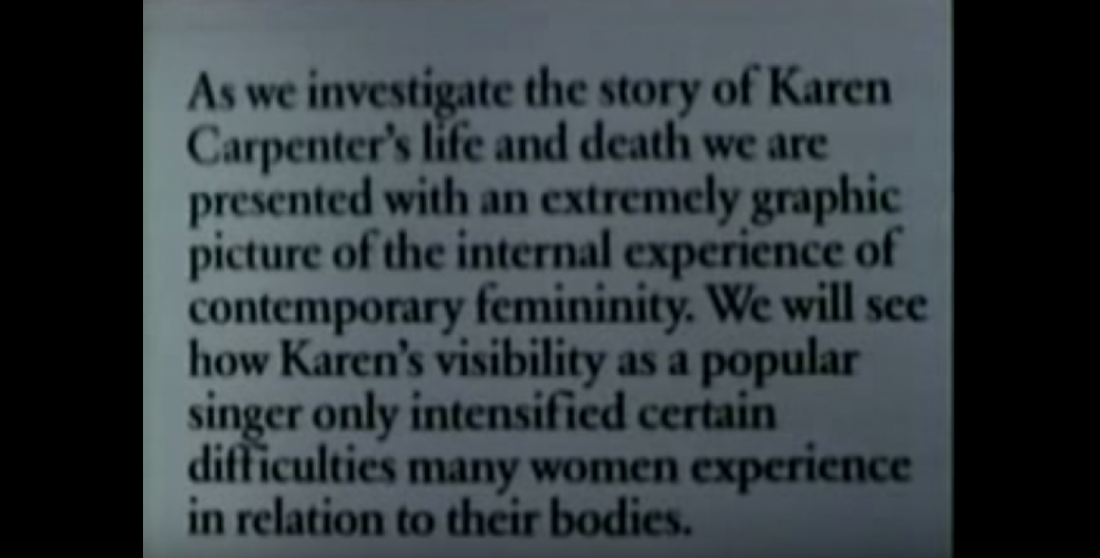
Carol may be Haynes' most successful film about women, but it certainly isn't his first. That honor goes to Superstar: The Karen Carpenter Story, which Karen's brother Richard forbid Haynes from circulating soon after its initial release due to copyright issues. The 43-minute short about '70s singer Karen Carpenter's ascent to fame - and descent into anorexia - too often gets distilled down to the two elements it's best known for: its innovative usage of Barbie dolls and its contraband status. But Superstar is so much more than a campy cult classic. This grim, touching, case study left indelible marks on Haynes' career. Without it, his resume might look much different than it does at present.
Although most fans only think of Haynes' work on Superstar, it's important not to forget his co-writer\producer Cynthia Schneider. The two became friends while attending Brown, and kept up the relationship post-graduation, when they discussed their interest in collaborating on a film. (Davis 11-15). The combination of Carpenter's untimely death from complications of her eating disorder, and a Barbie doll advertisement Haynes saw on TV, birthed the concept of Superstar (Davis 15-16). The finished product got its release in 1987. At first, Haynes and his team had difficulty finding places to screen Superstar, and had many prestigious venues (including the MoMA and the Whitney Museum of American Art) turn them down (Davis 26). However, Superstar rose above this initial setback and enjoyed widespread popularity. It was even screened at what would become the Sundance Film Festival (Davis 30). However, copyright issues caught up with the Superstar crew. First, they had a brief scuffle with Mattel over the plastic dolls used in the film. This fizzled out soon after it began; Mattel had bigger legal battles to fight at the time, and Haynes wrote them a very kind letter offering to add a disclaimer which said that the toys in the film were not Mattel products (Davis 33). The issues Richard Carpenter had with Superstar, however, would not get resolved so easily.
This setback could have snuffed out Haynes' budding career - but it didn't. He continued to make short films, and eventually moved onto feature-length projects - all imbued with the same creativity and sensitivity seen in Superstar. He returned to the pop biopic with Velvet Goldmine (Haynes, 2002) and I'm Not There (Haynes, 2007). Based on the life and career of American folk-rock singer Bob Dylan, I'm Not There subverts the standard biopic formula. Instead of one or two actors playing Dylan, it has six. Each explores a different aspect of his work and personality.
Haynes also continued to make female-centered films with similar themes to Superstar. In Safe (Haynes, 1995) Julienne Moore plays Cathy, a 1950s' housewife struggling to uphold her "June Cleaver" image while she processes her husband's homosexuality, and her own romantic interest in the family's African-American gardener. Superstar, Safe, and Carol all deal with a dilemma many women (and men) face: the pressure to uphold societal standards when those standards feel restrictive or unnatural. Haynes has a better understanding of the female experience than many of his male contemporaries in the business, and Superstar makes that insight - something necessary for the success of his future projects - evident.
Many people have forgotten Superstar, but it functions as an essential part of Todd Haynes' film catalog. It got his name out in the industry - even if its technical brilliance was eventually overshadowed by the scandal - and influenced his best films. Perhaps someday the Carpenter Estate will lift its ban on Superstar, and it can impact another generation - no longer hiding in shadows, but shining bright, as it deserves.
Works Cited
Davis, Glyn. Superstar: The Karen Carpenter Story. London: Wildflower Press, 2008. Print.




 RSS Feed
RSS Feed
